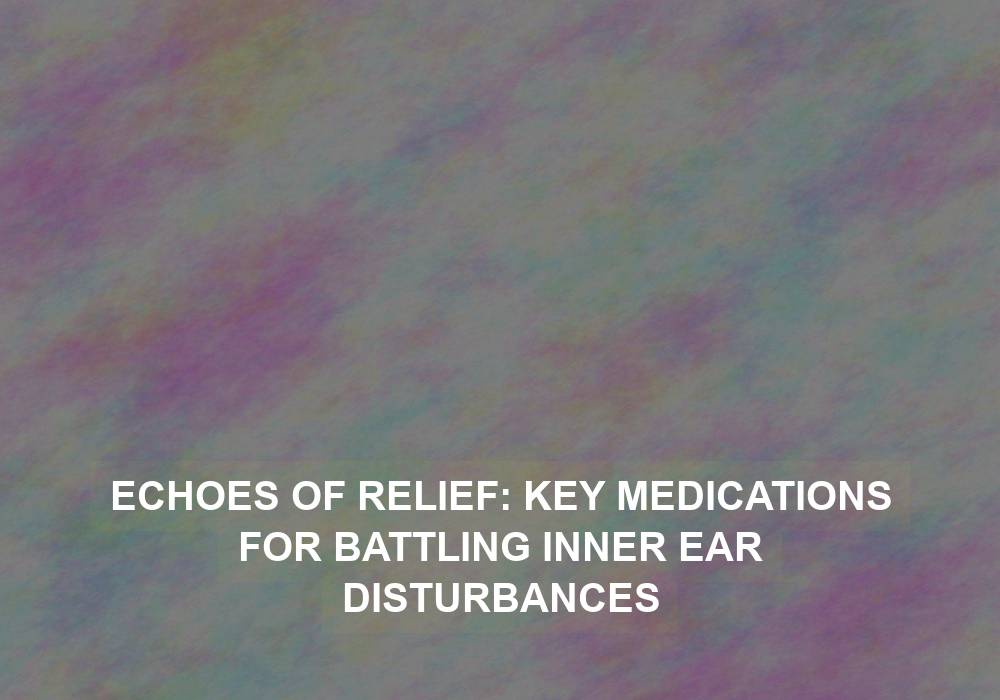The inner ear plays a crucial role in our auditory system as it is responsible for maintaining balance and transmitting sound signals to the brain. Unfortunately, inner ear disturbances can occur and lead to various disruptive symptoms such as dizziness, vertigo, tinnitus, and hearing loss. These symptoms can greatly impact an individual’s quality of life and overall well-being.
Thankfully, there are several key medications available that can help alleviate the discomfort and effectively manage inner ear disturbances. In this article, we will delve into these medications, exploring their mechanisms of action and potential benefits in detail.
1. Antihistamines
Antihistamines are commonly used to treat allergies, but they can also be beneficial in managing inner ear disturbances. These medications work by blocking the effects of histamine, a chemical released during an allergic reaction, which can contribute to inner ear inflammation and symptoms.
Some commonly prescribed antihistamines for inner ear disturbances include:
- Meclizine: Meclizine is an antihistamine often used to treat dizziness and motion sickness associated with inner ear disorders. It helps reduce the sensitivity of the inner ear and diminishes the intensity of vertigo episodes. Meclizine is available both over-the-counter and with a prescription.
- Diphenhydramine: Diphenhydramine, another antihistamine, can also be effective in reducing symptoms of inner ear disturbances. It has a sedative effect, which can alleviate dizziness and promote better sleep. Diphenhydramine is available over-the-counter.
In addition to their antihistamine properties, these medications may also possess other qualities that contribute to their effectiveness in managing inner ear disturbances. For example, meclizine has anticholinergic effects, which further help alleviate symptoms.
2. Benzodiazepines
Benzodiazepines are a class of medications commonly used as tranquilizers or sedatives. They can also be prescribed to manage certain inner ear disturbances, particularly those associated with anxiety and panic disorders.
Some benzodiazepines that may be recommended for inner ear disturbances include:
- Lorazepam: Lorazepam is an anti-anxiety medication that can help reduce the intensity of vertigo and dizziness caused by inner ear issues. It acts on the central nervous system, promoting relaxation and calming effects. Lorazepam is usually prescribed for short-term use due to its potential for dependence and withdrawal symptoms.
- Alprazolam: Alprazolam, commonly known by its brand name Xanax, is another benzodiazepine that may be prescribed for inner ear disturbances. Like lorazepam, it helps alleviate anxiety-related symptoms and can provide relief from vertigo and dizziness. Alprazolam is also typically prescribed for short-term use.
These medications work by enhancing the effects of gamma-aminobutyric acid (GABA), a neurotransmitter that inhibits the activity of neurons in the brain. By doing so, benzodiazepines help reduce the overactivity of the inner ear, leading to a decrease in symptoms.
3. Diuretics
Diuretics, also known as water pills, are medications that help increase urine production and reduce fluid retention in the body. They can be prescribed to manage inner ear disturbances related to Meniere’s disease, a condition characterized by recurring episodes of vertigo, tinnitus, and hearing loss.
Some commonly prescribed diuretics for inner ear disturbances include:
- Hydrochlorothiazide: Hydrochlorothiazide is a diuretic that helps reduce fluid buildup in the inner ear, decreasing the frequency and severity of vertigo attacks. It can also help manage associated symptoms such as tinnitus and hearing loss. Hydrochlorothiazide is usually taken orally, and the dosage may vary depending on the individual’s condition and response to treatment.
- Acetazolamide: Acetazolamide is another diuretic that can be beneficial for inner ear disturbances. It helps regulate fluid balance in the body, reducing the pressure in the inner ear and alleviating symptoms. Acetazolamide is often prescribed in combination with other medications to provide comprehensive treatment for Meniere’s disease.
It is important to note that diuretics should be used under the supervision of a healthcare professional, as they can have side effects and may interact with other medications. Regular monitoring of electrolyte levels and kidney function is typically recommended when using diuretics for inner ear disturbances.
4. Steroids
Steroids, such as corticosteroids, can be prescribed to manage inner ear disturbances caused by inflammation. They work by reducing inflammation and suppressing the immune response, which can help alleviate symptoms like dizziness and hearing loss.
Some commonly prescribed corticosteroids for inner ear disturbances include:
- Prednisone: Prednisone is a commonly prescribed corticosteroid for inner ear disturbances. It can help reduce inflammation in the inner ear, providing relief from symptoms and promoting the restoration of normal auditory function. Prednisone is usually taken orally, and the dosage may vary depending on the severity of the condition and the individual’s response to treatment.
- Dexamethasone: Dexamethasone is another corticosteroid that may be recommended for inner ear disturbances. It can be administered orally or through injections, depending on the severity of the condition. Dexamethasone helps reduce inflammation and control symptoms associated with inner ear disorders.
It is important to note that the use of steroids for inner ear disturbances is typically reserved for cases where other treatments have not been effective or in severe cases. Steroids may have side effects and should be used under the guidance of a healthcare professional.
Conclusion
Inner ear disturbances can significantly impact an individual’s daily life and well-being. However, with the help of appropriate medications, relief from symptoms is possible. Antihistamines, benzodiazepines, diuretics, and steroids are among the key medications that can effectively manage inner ear disturbances.
It is important to emphasize that these medications should be prescribed and monitored by a qualified healthcare professional. The choice of medication and dosage depends on the specific needs and underlying causes of the individual’s inner ear disturbances.
If you are experiencing any symptoms related to inner ear disturbances, it is advisable to seek medical attention and consult with a healthcare professional who can provide a personalized treatment plan tailored to your unique needs. Remember, managing inner ear disturbances with the right medications can bring back harmony and relief to your life.

